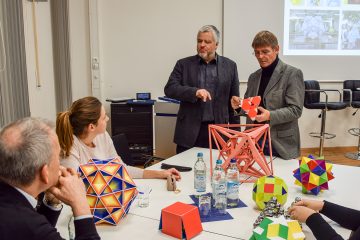Boon or bane? How AI is changing our lives

Munich, 05 October 2023
Digitalisation, artificial intelligence, robotics – collaboration between humans and machines has long been a fact of reality. What ethical and anthropological questions does the use of Artificial Intelligence in areas such as medicine and mobility raise? With autonomous systems, where does the responsibility lie? acatech discussed these issues with members of Plattform Lernende Systeme and more than 120 guests as part of acatech am Dienstag, which was held in Salon Luitpold on 26 September.
Dorothea Koert, a member of Plattform Lernende Systeme’s Learning Robotic Systems working group, set the tone for the evening by mentioning a quote attributed to the American economist Leo M. Cherne: “The computer is incredibly fast, accurate, and stupid. Man is incredibly slow, inaccurate, and brilliant. The marriage of the two is a force beyond calculation.” Dorothea Koert sees huge opportunities for society in the interaction between humans and computers. She gave the example of nursing, where AI-based robotics assist nursing staff with essential but tiresome tasks, freeing them up to attend to patients. Dorothea Koert was thus able to dispel the concern that humans will lose their jobs to AI, similar to the worries sparked by the industrial revolution of the 19th and 20th century.
Andrea Martin, Leader IBM Watson Center and member of the acatech Senate, concurred. On the whole, AI is a toolkit, which can be used to mimic individual components of human intelligence. However, no one AI system would be able to cover the full cognitive range of human intelligence. This is why the combination of human and artificial intelligence holds such a huge opportunity to enhance human performance. In order to fulfil its responsibilities in this regard, IBM has developed principles with regard to AI:
- The purpose of AI is to augment human intelligence, not replace it.
- Data and insights belong to their creator. The IBM business model is technology-driven, not data-driven.
- Technology must be transparent and explainable.
In his talk, Peter Dabrock, Professor of Systematic Theology at Friedrich-Alexander-University Erlangen-Nuremberg and acatech Executive Board member, raised the matter of law and ethics as parameters in risk assessment in the context of the European Union’s AI Directive. He said that with AI systems like ChatGPT, in particular, it is hard to carry out an assessment based on risk classes, as it must be very specific to the application. To conclude, Peter Dabrock remarked that he firmly believes that AI will take on a life of its own, evolving into something more than a pure instrument for humans to use.
The subsequent, lively discussion was moderated by Marc-Denis Weitze, acatech Office. The participants were particularly interested in the misuse of AI systems such as ChatGPT – specifically in the form of deepfakes – and the need for, or point of, regulating AI. Concern was raised that the majority of the global volume of AI data and most of the AI development is controlled by just a few companies. Similar to nuclear technology, there is a global dimension to AI as a disruptive technology, and it therefore perhaps requires global regulation.
The experts support this approach and emphasise that AI requires national, European and global regulation. European regulation must find the middle ground. On the one hand, AI must not be underregulated, in order to minimise misuse and risk of damage. On the other hand, the EU should not overregulate AI either, as it would run the risk of driving AI research and development out of Europe – which would result in greater dependence on non-European AI systems.
Regulation is also necessary to enhance customer confidence in AI, which is lacking to some extent. For example, the fear that using AI could lead to discrimination is one of the main reasons why companies are reluctant to do so. For this reason, a regulatory framework for AI is required at European level. At the same time, a regulatory framework based on risk classes could integrate liability and consumer protection principles, and set global standards for AI regulation.
The final topic up for debate was the extent to which AI systems will help us in our everyday lives in future. It seems clear that in certain applications, such as booking tickets in the mobility sector or in medical applications, AI is already proving a boon. At the same time, however, this entails a loss of skills that could result in humans having difficulty dealing with important everyday situations without AI assistants – already many people would not be able to find their way without navigation apps. Boon and bane are two sides of the one coin and the important thing will be to strike a balance between the two.





